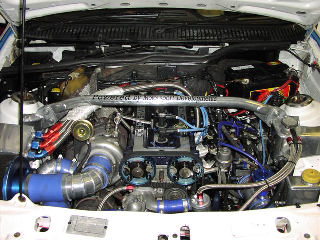Engine Tuning
By Shenron on Oct 27, 2007 with Comments 1
Engine tuning usually relates to modifying, adjusting or designing components of the engine to increase power and performance. Performance can be realized in both power gains, as well as efficiency. For instance, you might tune an engine to increase it’s horsepower. However, you can also tune an engine to save on fuel efficiency as well.
While some modifications require very little time, money and effort to achieve, others can be extremely time consuming, cost thousands of dollars and require skilled labor. Simple engine tuning usually requires some performance modifications, however, for complex engine tuning, you will either have to overhaul or rebuild an engine.
Simple to Moderate Types of Engine Tuning
Three simple types of engine tuning include the general tune up, chip tuning and performance tuning.
General Tune Up
Practically every car requires a general tune up. Tune ups are required for general maintenance of a vehicle at select intervals. Each interval is different for each make and model car, but most vehicles require a tune at least once every two years. Most tune ups include; inspection of the engine, ignition, distributor cap and rotor, replacement of air filters, gas filters or other types of filters, emission control inspection, changing spark plugs and spark plug wires, changing the oil, checking belts or timing chain, etc. Usually once a general tune up is performed on a vehicle, gains in fuel efficiency will immediately be realized (usually from about 1% to 5% in fuel efficiency gains).
Practically every car has an EPROM or computer chip installed in order to help the car’s engine perform efficiently. While some car’s chips are programmed to achieve high performance as in speed, horsepower and torque, other cars are programmed to be fuel efficient. By swapping a car’s chip or reprogramming a chip, a driver can modify the engine controls in order to achieve a specific type of performance. For instance, you can easily swap a chip to add several horsepower to your vehicle. In addition, you can also swap a chip to make it more fuel efficient.
Performance Tuning
Performance tuning is when high performance parts are added or replace other engine parts in a vehicle. For instance, a simple way to indulge in performance tuning is to add high performance spark plugs, however more complicated methods of performance tuning might be to add a new exhaust system to the vehicle for it to perform better (achieve higher horse power and faster acceleration). There are plenty of ways to achieve performance tuning and there are hundreds of products available- usually after market products that are designed and built by commercial enterprises and sold to the public. It should be noted that while many performance tuning items are street legal, others may not be- especially those that modify the sound of the engine to large degree or modify the amount of emissions that a vehicle gives off.
Extensive Engine Tuning
While there are easy ways to tune your engine that are usually affordable, if you are looking for maximum performance, you will usually need to do extensive engine tuning to your vehicle. This may include an overhaul of major engine parts or rebuilding specific engine parts.
For instance if you would like to maximize acceleration and horsepower, you may need to replace the pistons or lifters. These types of modifications can be time consuming, costly and require some skills. Other types of extensive modification include adding a turbo booster, nitro and ram air vents. Just like other types of engine modifications, some are perfectly street legal, while others are not. Check with your locality, as each localities motor vehicle, emission control standards and sound standards differ.
Filed Under: General


[…] to form NOx, which in a standard gasoline engine is one of the most dangerous pollutants an engine can create. Since stratified charge engines including clean gas induction do not give the exhaust […]